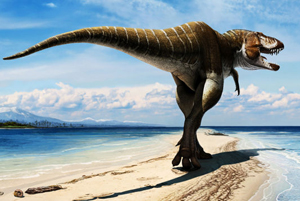 London, May 7: Dinosaurs are alive and here! Although most dinosaurs went extinct 65 million years ago, one dinosaur lineage survived and lives on today as a major evolutionary success story - the birds, according to a new Oxford study.
London, May 7: Dinosaurs are alive and here! Although most dinosaurs went extinct 65 million years ago, one dinosaur lineage survived and lives on today as a major evolutionary success story - the birds, according to a new Oxford study.
The study that'weighed' hundreds of dinosaurs suggests shrinking their bodies may have helped the group that became birds to continue exploiting new ecological niches throughout their evolution, and become hugely successful today.
An international team, led by scientists at Oxford University and the Royal Ontario Museum, estimated the body mass of 426 dinosaur species based on the thickness of their leg bones.
The team found that dinosaurs showed rapid rates of body size evolution shortly after their origins, around 220 million years ago.
However, these soon slowed: only the evolutionary line leading to birds continued to change size at this rate, and continued to do so for 170 million years, producing new ecological diversity not seen in other dinosaurs.
"Dinosaurs aren't extinct; there are about 10,000 species alive today in the form of birds. We wanted to understand the evolutionary links between this exceptional living group, and their Mesozoic relatives, including well-known extinct species like T rex, Triceratops, and Stegosaurus," said Dr Roger Benson of Oxford's Department of Earth Sciences.
"We found exceptional body mass variation in the dinosaur line leading to birds, especially in the feathered dinosaurs called maniraptorans. These include Jurassic Park's Velociraptor, birds, and a huge range of other forms, weighing anything from 15 grams to 3 tonnes, and eating meat, plants, and more omnivorous diets," said Benson, who led the study.
The team believes that small body size might have been key to maintaining evolutionary potential in birds, which broke the lower body size limit of around 1 kilogramme seen in other dinosaurs.
They examined rates of body size evolution on the entire family tree of dinosaurs, sampled throughout their first 160 million years on Earth.
"What we found was striking. Dinosaur body size evolved very rapidly in early forms, likely associated with the invasion of new ecological niches. In general, rates slowed down as these lineages continued to diversify," said Dr David Evans at the Royal Ontario Museum, who co-devised the project.
"But it's the sustained high rates of evolution in the feathered maniraptoran dinosaur lineage that led to birds - second great evolutionary radiation of dinosaurs," said Evans.
The evolutionary line leading to birds kept experimenting with different, often radically smaller, body sizes - enabling new body 'designs' and adaptations to arise more rapidly than among larger dinosaurs.
Other dinosaur groups failed to do this, got locked in to narrow ecological niches, and ultimately went extinct.
The research was published in the journal PLOS Biology.





Comments
Add new comment